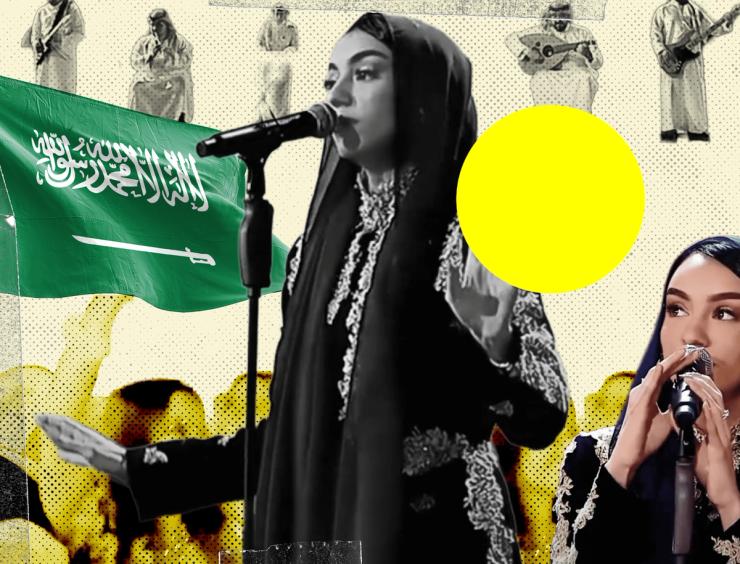Camilla’s view
Women in the Gulf, especially Saudi Arabia, have taken on greater roles in society and the workplace over the past decade, rising to prominence in fashion, music, film, and the arts. But the most visible female performers are still constrained, forced to navigate complex paths to fame while balancing the expectations of family, clan, and a conservative society.
Reforms led by Saudi Crown Prince Mohammed bin Salman ushered in a new paradigm in which women in the kingdom can drive, travel abroad without a male guardian, work, marry, divorce, and socialize in mixed-gender spaces. It’s easy for expats to assume that once official restrictions are lifted, societies rush headlong into new freedoms. The experiences of women performers illustrate the challenges.
This month in Moscow, Russian President Vladimir Putin rebooted Intervision, a Soviet-era song contest now open to countries worldwide. Marketed as a wholesome alternative to the “decadent” Eurovision — the larger, more famous contest from which Russia was banned after invading Ukraine — Intervision was catnip to the Gulf: Qatar, Saudi Arabia, and the UAE all sent entries.
The UAE played it safe with traditional Emirati performer Saif Alali, but both Qatar and Saudi showcased female artists. Charismatic Qatari singer and composer Dana Al Meer, already a veteran of the 2022 men’s soccer world World Cup and 2023 Asian Cup opening ceremonies, came in third.
The more revolutionary entry was Saudi Arabia’s Zena Emad, the Gen Z rising star of Arabic music. At just 25, with over 2.2 million Instagram followers, Zena emerged soon after restrictions on women were lifted, winning a Ministry of Culture music award in 2018. She co-wrote and performed the Arabic version of the theme for the multiplayer online game Land of Heroes with Norwegian DJ Alan Walker — hard to imagine a more Saudi Gen Z line in a discography.
That she is mainstream now is extraordinary. Just four years ago, at the Red Sea Film Festival, I spoke with Haifaa al-Mansour about her award-winning Wadjda, the first full-length feature made by a female Saudi director. She shot it in Saudi in 2012, directing from the back of a van, via walkie-talkie, because she could not publicly mix with the men she employed in her crew.
When I first started reporting on the kingdom in 2021, most women were still cloaked in black, though some had adopted colourful abayas, jackets, and uncovered hair. By 2025, I was surprised that not much changed: At Soundstorm or international conferences, women’s dress has transformed; in the malls or the Riyadh metro, it’s still 2021. Reports last month that some “music lounges” were shut down were a sign of the first conservative pushback against cultural liberalization.
In Moscow, Emad was on stage, backed by a male band; beautiful in full make-up and long black and gold dress, some hair showing from under her headscarf. The balance struck on her path to fame is not yet uniform across the Gulf’s music scene.
One club tune has been ubiquitous this summer. Whether at London’s hippest workout studios, an Ibiza bar after dark, Mykonos beach; even Hamptons’ house party, you couldn’t escape Ma Tnsani by Vanco and AYA.
First played live during South African producer/DJ Vanco’s New Year’s Eve set at Ushuaïa, one of Dubai’s biggest clubs, it quickly became an underground dance classic. The compelling bassline and repetitive chorus made it one of biggest weapons in any DJ set, causing hundreds of thousands of clubbers and music fans to sing along to its all-Arabic lyrics, joining in with the ‘Yalla Habibi’ and ‘Ahla Laila Ahla Nas’ [come on my love, and beautiful night, beautiful people] refrains.
Vanco, you might have seen. The Kuwaiti female duo who wrote the lyrics and perform under the name AYA System, are mostly hidden. The singers are at the forefront of an emerging Afro-Khaleeji club sound, with just a few followers on Instagram. You won’t see celebratory photos of them performing their hit — actually, you won’t see any photos of them. Instead, there’s just a drawing, an outline of the back of the heads of two young women in hoodies.
AYA have gone out of their way to keep their identity under wraps. Why? We’re back to those complexities that need to be navigated.
One of the duo told Rolling Stone MENA that although she always wanted to make music, it’s taken until now (her late 20s) to have the confidence: “Because of shame culture, really, and 3aib (disgraceful) — you become shackled in your own mind. Shame culture is so strong, you end up self-policing.”
So while Gulf women now have space to sing, compose, and lean into the role of progressive music artists, patriarchal constraints remain. Their sound can go global, but for many women, they are still invisible at home.
Camilla Wright is a media commentator and writer for global news and pop culture outlets, and publishes Britain’s biggest and best known newsletter.
Notable
- The breakout song of the summer was the first time the duo behind AYA collaborated in a professional studio. Ayla Mooro interviews the pair and charts their rise in Rolling Stone Middle East.


